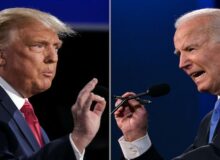There’s lots of post-debate analysis by the talking heads. There are a couple of points raised last night that nobody is talking about on the news and they were simply glazed over last evening during the debate. To me, they were some of the more salient points raised. Point #1 had to do with the political role being played by the Federal Reserve (which is supposed to be apolitical) and point #2 had to do with launching spending programs on top of an accumulated $20 trillion deficit while jump-starting the economy via spending programs while also raising taxes. I’m a simple B school guy, but I do have an MBA in Finance. That and five bucks gets me served up pretty good at Starbuck though. But, truth be told, I have stayed at a few Holiday Inn Expresses in my days, so I’ll take a stab at explaining.
As to point #1. The observation is spot-on. The Fed has very few tools at its disposal to control interest rates and it has used every tool in its tool box. Market prognosticators have assumed a gradual increase in interest rates should have already taken place; however, prior to the election everything has been kept artificially low. Keeping interest rates artificially low can only be explained as a political move by the Fed Chair. The prolonged period of time with rates artificially low will exacerbate a correction when the correction is made; and it will have a greater impact on both the stock and bond markets. On the bond market, it’s a no-brainer: there’s an inverse relationship between bond prices and interest rates. As far as stocks go, they’ll drop too and here’s the basic reason why. As interest rates rise, both households and companies will cut back on spending….and the cost of capital is more expensive, so you see less expansion. This contraction in consumer and corporate spending will lead to a decline in earnings that will eventually be reflected in the stock prices.
So, you have the Fed keeping interest rates artificially low and the stock market is humming along, unadjusted. You start to have the Fed work its corrections (after the election) and the stock and bond markets are both going to be jolted. Not too great news for folks nearing retirement…BUT, the Fed will be to blame. They should have started to increase interest rates a long time ago. The point that the Fed Chair is engaged in party politics was, once again, glazed over…BUT IT’S A MASSIVE POINT that flew over the heads of many. So, in my simpleton redneck MBA style I can tell you: y’all are fixin to see a correction that’s gonna screw ya.
Secondly, there was criticism over launching spending programs on top of an accumulated $20 trillion deficit as the answer for jump-starting the economy. As for that strategy, I’d have to say, “Let me ask you a stupid question…when was the last time that a nation ever spent its way into prosperity; especially when they were already leveraged with debt?”
One candidate described “trickle down” economics as tried and failed. Not true. When you lower tax rates you can actually increase tax revenues. It worked in the Reagan years. Here’s the simple reason why it works. If tax rates are high, more money goes to Uncle Sam and less money remains behind for both discretionary spending and investment. It’s harder to create jobs when a business owner’s money is in the government’s coffers rather than in the business owners’ pockets. In redneck MBA style: “ya can’t invest what ya don’t have.” If you have money to expand, guess what? You can actually expand…and that makes the base larger. What they neglected to say during the debate was that close to 95 million Americans have left or are not in the workforce…so there’s a big disconnect between the unemployment rate and the labor participation rate, because folks have given up.
One candidate claimed that the Reagan years’ supply side economics or “trickle down” led to a financial downturn. Not true at all. The downturn was mainly due to the banking system and was mostly due to banks being forced, via government mandate, to take on substandard loans (mortgage credit standards fell), home values increased as the bubble built and folks began to refinance at jacked up appraisal values. So, when the bubble burst, folks who had easy access to large dollar properties (more than they could really afford) soon found that that the value of the properties were now worth less than what they were mortgaged for. In short, they were “upside down.” Furthermore, they were stuck. Nobody could bail them out once the values corrected. What happened was: the Reagan years created the expansion and the expansion put forth a sense of security and ease. As folks started to feel more comfortable, lending standards were relaxed and new lending instruments, such as interest only mortgages lured folks into a false sense of security. When lending standards were relaxed, appraisals went sky-high and properties were over-valued…then the bubble burst and folks were left over-leveraged. You can blame it on “greed;” but it was set up by government’s desire for folks to have increased home ownership and for standards to be relaxed. This may not be a great explanation; but, once again, I’m a state university B-school guy. I can talk a lot more about beer than I can about this stuff.
What I can tell you is this: look at the countries that encouraged great corporate growth….Ireland is a great example. They set corporate tax rates low and the economy took off. Many U.S. firms (Dell, etc.) set up shop in Ireland. This was a period of time known as the “Celtic Tiger.” There was a bunch of foreign investment in Ireland and folks finally had good jobs and wealth in their pockets. What was it that eventually killed the Celtic Tiger? The same things happened in Ireland that happened in the U.S.: there was a housing bubble that burst. Suffice it to say, however, it was the low Corporate tax rates that created the Tiger and encouraged foreign investment.
While one candidate focused on a policy of more mandated benefits (paid leave, forced profit sharing, etc.). This erodes profitability and makes companies less able to create jobs…especially when the government is simultaneously increasing corporate tax rates. Quite frankly put: it’s stupid; but it sounds good. The other candidate is focused on a pro-growth strategy that stems from lower taxes. Imagine if taxes were lower and the 95 million folks out of the workforce were back in; you’d had a vastly expanded tax base. Once again, folks can’t create jobs if the dollars are in Uncle Sam’s pocket.
Well enough of my rambling. Just wanted to shine the light on the biggest points made during the debate that were missed by the media. These are biggies. Not only are they biggies in terms of impact; but, they are also big differentiating strategies between candidates. One candidate is absolutely right. The other candidate wore a red pant suit.
Tags: Debate Trump




















Join the conversation!
We have no tolerance for comments containing violence, racism, vulgarity, profanity, all caps, or discourteous behavior. Thank you for partnering with us to maintain a courteous and useful public environment where we can engage in reasonable discourse.